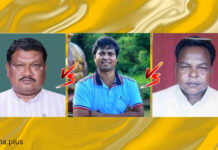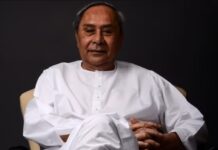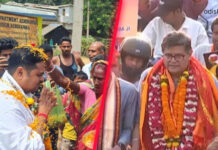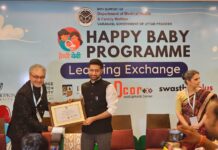Bhaskar Parichha
Odisha and West Bengal, two geographically contiguous states of India, are as much proximate in culture and language. Both states have a close link – from people’s movements to culinary familiarity. More to that. Puri attracts lakhs of people from Bengal. In truth, it is the Bengalis around whom the holy city of Puri revolves. They contribute greatly to the city’s economy.
The Tagore family of Jorasonko too had a close connection with Odisha and it stretches back to generations. Rabindranath Tagore’s great grandfather Nilamani Thakur had come to Cuttack as a ‘sirastadar’ (revenue collector) duly appointed by the British.
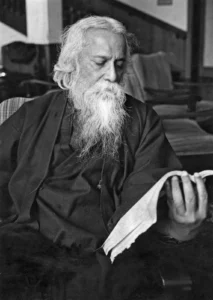
In 1840, Rabindranath’s grandfather Prince Dwarikanath Tagore had bought a small estate near Pandua in the present Jagatsinghpur district. Tagore’s even had a house built in Cuttack’s Tulsipur area. Still later, Rabindranath’s father Maharshi Debendranath Tagore visited Odisha sometime around 1851 to supervise the estate at Pandua from where he visited Puri.
Records of those times bring out how the Tagore family was fascinated by Puri’s pristine beach, the camaraderie, and the cool breeze.
In 1891, Rabindranath Tagore visited Odisha for the first time to oversee the land his ancestors had bought. Tagore’s maiden visit to Odisha was memorable and soul-stirring. The bard’s fascination for Puri finds mention in ‘Chinnapatra’ – his letters to Indira Devi, Tagore’s niece. In one such letter, Tagore wrote:
‘The road from Cuttack to Puri is good. It is high with low-lying fields on both sides. There are big shady trees, mostly mango. At this time all the mango trees are in blossom, filling the way with fragrance. Some villages are surrounded by mango, pipal, banyan, coconut, and palm trees.’
Tagore informs further:
‘At places covered, carts are standing on the banks of shallow rivers. There are confectioners under palm-leaf thatches. Inside the huts in rows, under the trees on both sides of the road, the pilgrims are taking their meals. The beggars are shouting in strange languages, whenever they see fresh batches of pilgrims or carriages or palanquins.’
He wrote fabulously about what he saw on his way to the Glorious city of Puri:
‘As one approaches nearer to Puri, the pilgrims are seen in greater numbers. Covered carts are moving in lines. People are found lying down, looking or gossiping together on the banks of tanks. On the right side of the road, there is a big spire of the Jagannath temple. Suddenly at one place, crossing the line of trees and bushes, the wide stretch of sandy sea-beach and the azure line of the sea become visible.’
Tagore visited Odisha once more in 1893. This time it was Cuttack with his nephew Balendranath. Tagore was a guest at the then-District magistrate BL Gupta, ICS ( Malati Chaudhury’s grandfather). Having spent a few days there, Tagore set out to Puri on a palanquin and he was spellbound over the unspoiled sceneries on both sides of the Jagannath Sadak as it was called then. Tagore’s last visit to Odisha was in 1939.
This particular visit was at the request of Biswanath Das, the then Chief Minister (called Prime Minister ) of Odisha to visit the province. When Das was in Kolkata to attend a meeting of the All India Congress Committee, he personally met the poet to pay respect and extend the invite.
Tagore reached Puri on 19th April in 1939. He was warmly received by the ministers and government officials. The poet stayed in the Circuit House as the state government’s guest. But, all his engagements were canceled as the poet developed a slight fever and the doctors advised him complete rest.
On 8th May 1939, the poet was given an ovation on behalf of the women of Odisha. The next day – his birthday – was celebrated with gusto. The birthday bash was held on a well-decorated pandal with an opening song. The poet was welcomed with the chanting of Vedic hymns by the pundits of Puri’s Sanskrit College. Flower, sandal paste, vermilion, and coconuts were offered to the poet as a mark of veneration.

So enthralled was Tagore at this spirit of love and affection that he wrote in a letter to his former Secretary Dr. Amiya Chakravarti:
‘I have come to Puri. I am the invited guest of those who is now at the helm of the affairs of Orissa. There is something novel in this fact. In older days, those who were kings or heads of the state, used to honor the meritorious, thereby honoring their own countries and governments. By this liberality, they used to keep contact with human culture and admit the universal heritage in the development of faculties.’
He further wrote:
`We have learnt the modern system of political administration from the English. The talented have no place in it. The statesmen of Europe wield the outward aspect of that power which is based upon economic and administrative laws. They cannot have the right to govern the spirit that lies underneath but it is needless to argue that having acknowledged and paid due regard to it, a noble environment can be created for the government. In oriental system of administration the scope for acknowledgment of the individual talent has, however, not been neglected.’
In the same letter, he was apologetic:
‘Let me now tell you about myself. I have no work here, nor am I of any use to anybody. Those who are taking care of me here, expect no material advice from me. That salutary and refreshing effect with which the sea breeze is touching my body and mind is the very symbol of the hospitality of the newly responsible Orissa Government. Administrative procedure has created no obstacle to it, nor has it been affected by the budgetary economy.’
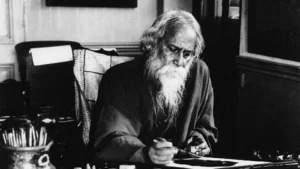
On human relations Rabindranath wrote at the time he was convalescing:
‘Sitting on the first floor of the Circuit House, I have unhesitatingly given myself up to pure idleness. The ministers here, having noticed the tired condition of my health, come every day to encourage me to spend my days without any purpose. The mentality of admitting human relationship even in the midst of heavy pressure of work is still inherent in our country; and this has been felt by me especially after I have come over here.’
During his stay at Puri, the Raja of Puri – an institution by himself – and the Superintendent of Sri Jagannath temple, bestowed upon Rabindranath, the title Parama Guru (the great teacher). As the poet was indisposed, the ceremony was not held publicly. The Dewan (Manager) of the king came down to the circuit house in a procession to confer the title. The panegyric was read out in the hallowed Sanskrit language. Then a camphor garland, head dress and a pair of silk clothes were offered as a mark of respect by the chief priest.
Historian Prof. Pravat Mukherji later wrote about Tagore’s acceptance of the recognition thus: He had been warmly received in many countries of the world, but the reception which was given that day by the people of Odisha touched his heart, as it was according to the traditional Hindu style.
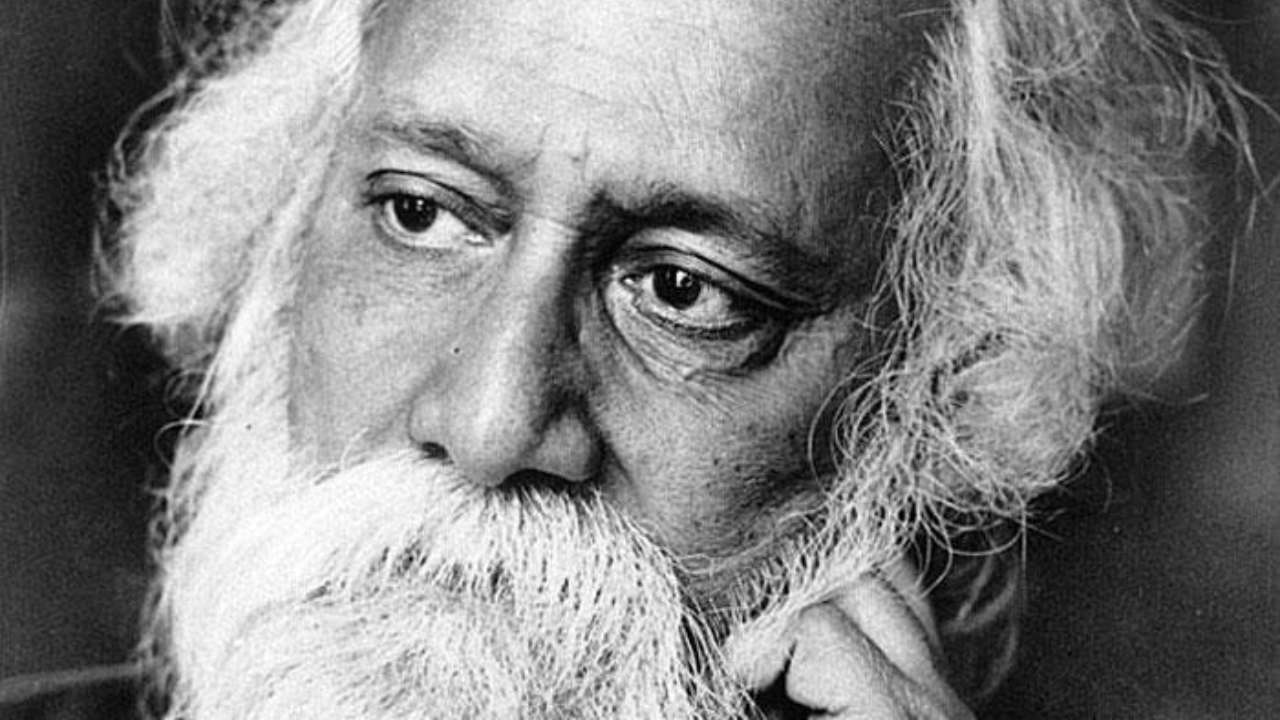
Tagore’s stay in Puri had a few other blissful moments. Many poets and freedom fighters met him. Among them were Lexicographer and compiler of ‘Purnachandra Bhashakosh’(Odia Encyclopedia) Gopal Chandra Praharaj, Pandit Raghunath Mishra, freedom fighter Sarala Devi, poet and novelist Kalindi Charan Panigrahi and yet another gentleman from Jajpur Chandrasekhar Das about whom Tagore penned a few lines: O’ my unknown admirer, Today you have become known. With my blessings I repay My admirer your loan.’’
Two contemporary Odia poets – Bhaktakabi Madhu Sudan Rao and Kantakabi Laksmikanta Mohapatra (creator of the state song ‘Bande Utkal Janani’) – were inspired by Tagore and wrote two books – ‘Kusumanjali (Posy of Flowers) ’ and ‘Jiban Sangeeta (Life Song) ’ respectively, which are rare beginnings in modern Odia literature.
It was also during the Puri layover that Tagore wrote the dance drama’ – the theme he seemed to have overheard from the local epic-Sayers. Tagore also wrote some of his famous poems: Pravasi (The outsider), Janmadin (The birthday)and Epare Opare (This side and that side)in Puri. In Pravasi, Tagore describes himself as a ‘man of the world and he does not consider anybody to be alien.’
Tagore loved the people of Odisha so much that he concluded:
‘From a distance I have formed an idea about the love of the people and the efficiency of those who are at the helm of the administration of Orissa at present, and now I am appreciating it from close quarters.’

